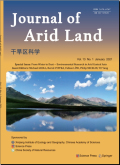首页|期刊导航|Journal of Arid Land|Prospects and limitations of soil amendment and irrigation techniques for the water-saving public urban greenery and ephemeral weed management in the sandy soils of the United Arab Emirates
Journal of Arid Land2024,Vol.16Issue(9):P.1288-1302,15.DOI:10.1007/s40333-024-0028-9
Prospects and limitations of soil amendment and irrigation techniques for the water-saving public urban greenery and ephemeral weed management in the sandy soils of the United Arab Emirates
摘要
关键词
native and exotic plant communities/competitive strength/soil improvers/urban plantation/subsoil amendment/weed management分类
建筑与水利引用本文复制引用
Ayesha ALAM,Elke GABRIEL-NEUMANN..Prospects and limitations of soil amendment and irrigation techniques for the water-saving public urban greenery and ephemeral weed management in the sandy soils of the United Arab Emirates[J].Journal of Arid Land,2024,16(9):P.1288-1302,15.基金项目
partly funded by the Al Ain Municipality ()
National Water and Energy Center, United Arab Emirates University。 ()

